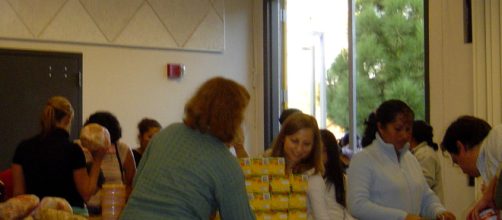One would think that going to a food bank should be out of the norm, especially in an affluent society like the UK. Yet, according to a new report published by the Trussell Trust, the UK's biggest nationwide food bank network, demand has surged over the last year. Between 2017 and now, the organisation handed out over 1.3 million food parcels to approximately 666'000 people. This represents a 13 percent jump from the previous year. According to the Guardian, this sharp rise is even more significant in areas where Universal Credit has been introduced.
In fact, in those areas, food banks have experienced a 52 percent increase in demand. The stats are truly staggering, as highlighted by Greenwich Foodbank on Twitter.
In the last year we provided 7505 emergency food supplies to local people in crisis. We’re grateful for the ongoing support the community shows & will hope one day there will no
— Greenwich Foodbank (@GreenwichFoodBk) April 24, 2018
need for our work #StopUKHunger pic.twitter.com/8rV6kViLWp
Is universal credit driving people to food banks?
Trussell Trust has partially blamed delays in universal credit payment and administrative problems for pushing thousands into food poverty, rent arrears, and ill health. According to Sky News, many charities agree that changes to the welfare system have pushed thousands below the breadline.
Universal credit was introduced as a monthly replacement payment for six different types of benefits. Whereas before, recipients got bi-monthly payments, they now receive one monthly lump sum. Delays in processing individual change-overs to universal credit have seen many people penniless for several weeks. A special Sky News report also showed one man explaining that many vulnerable people cannot handle receiving one large monthly sum. Unable to budget adequately, they spend benefits quickly and struggle to make ends meet. This view is mirrored by the figures published in the Trussell Trust report. In areas with full universal credit rollout, the demand for food parcels has risen by 52 percent, compared to a 13 percent increase elsewhere in the UK.
According to the Guardian, the trust's report also showed that inadequate benefits administration along with evidence that the payment is insufficient to cover the basics are to blame for the surge in demand for food parcels.
The report also highlighted that even those on low incomes are at risk of food poverty. Individuals on zero-hour contracts or working on a freelance basis have also been making the trip to their local food banks.
If you're homeless, you may not even be able to get benefits
The universal credit rollout has caused enormous problems for thousands of people on benefit. Apart from the aforementioned issues, some people also struggle because it is an online-only system. In addition, some homeless people cannot even access universal credit or traditional benefits because they have no address and no bank account.
Sky News spoke to Ryan Abrahams, a nineteen-year-old homeless man.
Trussell Trust: this is completely unacceptable
After the publication of the report in April, Trussell Trust's chief executive Emma Revie spoke to the Guardian. “This completely unacceptable. We need to move towards a UK where no one needs a food bank’s help, not a country where charity provision is the only defence from utter destitution.” The report also illustrates that people are falling between the cracks of a system unable to hold them. As a result, many are forced to turn to charities where, in fact, they should be able to get assistance through a nationwide, government-run safety net.


